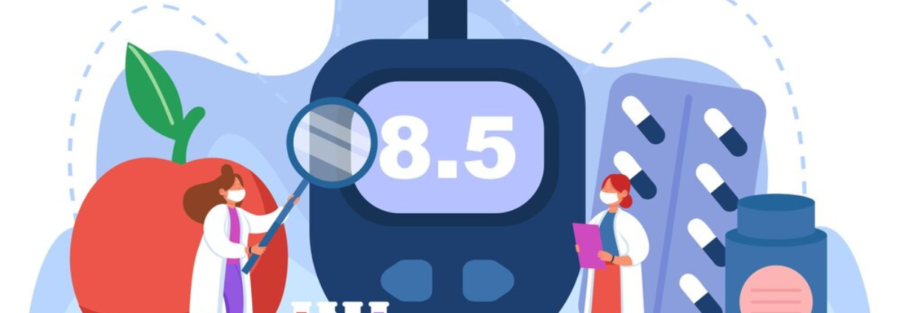Welcome to our clinic’s informative blog post on the importance of a diabetic diet for blood sugar control. As a trusted diabetes specialist in Patiala, Dr. Arpit Garg is dedicated to providing comprehensive care and guidance to individuals with diabetes. Managing blood sugar levels is crucial for maintaining overall health and preventing complications associated with diabetes. In this article, we will explore the significance of a diabetic diet, including what to eat and what to avoid, and how consulting a diabetes specialist can help individuals achieve optimal blood sugar control.
The Importance of a Diabetic Diet:
A diabetic diet plays a crucial role in managing blood sugar levels and maintaining overall health for individuals with diabetes. Proper nutrition is key to regulating blood sugar levels, preventing spikes and crashes, and minimizing the risk of long-term complications. A well-balanced diabetic diet focuses on consuming nutrient-rich foods in appropriate portions while avoiding those that can cause blood sugar fluctuations.
What to Eat for Blood Sugar Control:
1. Complex Carbohydrates:
Include high-fiber, complex carbohydrates in your diet, such as whole grains, legumes, fruits, and vegetables. These carbohydrates are digested slowly, leading to a gradual rise in blood sugar levels. They provide essential nutrients and fiber that promote satiety and support overall health.
2. Lean Proteins:
Incorporate lean protein sources, such as skinless poultry, fish, tofu, legumes, and low-fat dairy products, into your meals. Proteins help stabilize blood sugar levels, promote feelings of fullness, and aid in muscle repair and maintenance.
3. Healthy Fats:
Include healthy fats in your diet, such as avocados, nuts, seeds, and olive oil. These fats provide essential nutrients and promote satiety. They also help regulate blood sugar levels and support heart health.
4. Non-Starchy Vegetables:
Fill your plate with non-starchy vegetables, such as leafy greens, broccoli, cauliflower, peppers, and mushrooms. These vegetables are low in carbohydrates and rich in vitamins, minerals, and fiber, making them excellent choices for blood sugar control.
5. Fruits:
Enjoy fruits in moderation, focusing on those with a lower glycemic index, such as berries, cherries, apples, and pears. Pairing fruits with a source of protein or healthy fat can help slow down the release of sugars into the bloodstream.
What to Avoid for Blood Sugar Control:
1. Refined Carbohydrates:
Limit or avoid foods high in refined carbohydrates, such as white bread, white rice, sugary cereals, pastries, and sugary beverages. These foods can cause rapid spikes in blood sugar levels and should be replaced with healthier alternatives.
2. Added Sugars:
Minimize the consumption of foods and drinks with added sugars, including candies, desserts, sodas, flavored yogurts, and sweetened beverages. Opt for naturally sweetened options or choose sugar substitutes in moderation.
3. Processed Foods:
Reduce the intake of processed foods, including packaged snacks, fast food, and frozen meals. These foods often contain unhealthy fats, high sodium content, and added sugars, which can negatively impact blood sugar control and overall health.
4. Saturated and Trans Fats:
Limit the consumption of foods high in saturated and trans fats, such as fatty cuts of meat, full-fat dairy products, fried foods, and commercially baked goods. These fats can increase the risk of heart disease and impact blood sugar regulation.
5. Excessive Alcohol:
Moderate alcohol consumption is generally safe for individuals with diabetes. However, excessive alcohol intake can lead to unstable blood sugar levels, especially if consumed without food. It is important to monitor blood sugar levels when consuming alcohol and do so in moderation.
Consulting a Diabetes Specialist in Patiala:
Consulting a diabetes specialist in Patiala, such as Dr. Arpit Garg, is crucial for personalized guidance and support in managing blood sugar levels through a diabetic diet. A diabetes specialist can provide tailored recommendations based on an individual’s unique needs, preferences, and health goals.
Benefits of Consulting a Diabetes Specialist:
1. Individualized Assessment:
A diabetes specialist in Patiala will conduct a comprehensive assessment, considering factors such as age, weight, medical history, lifestyle, and personal preferences. This assessment helps develop a personalized diabetic diet plan that suits the individual’s specific needs.
2. Nutritional Guidance:
A diabetes specialist provides expert guidance on meal planning, portion control, and carbohydrate counting. They can help individuals make informed choices, select appropriate food combinations, and optimize nutritional intake while managing blood sugar levels effectively.
3. Education and Support:
Diabetes specialists in Patiala offer valuable education on diabetes management, including the importance of regular blood sugar monitoring, medication management, and lifestyle modifications. They provide ongoing support, address concerns, and offer practical strategies for long-term success.
4. Monitoring and Adjustments:
A diabetes specialist in Patiala monitors blood sugar levels, assesses progress, and makes necessary adjustments to the diabetic diet plan. Regular follow-up visits allow for continuous monitoring and help individuals stay on track with their blood sugar control goals.
Conclusion:
A well-balanced diabetic diet plays a vital role in blood sugar control and overall health for individuals with diabetes. By focusing on nutrient-rich foods, portion control, and avoiding foods that cause blood sugar spikes, individuals can achieve optimal blood sugar control and reduce the risk of complications. Consulting a trusted diabetes specialist, such as Dr. Arpit Garg, provides personalized guidance, education, and support in managing blood sugar levels effectively. Embrace the benefits of a diabetic diet and the expertise available to you, and take control of your diabetes for a healthier, more balanced life.



